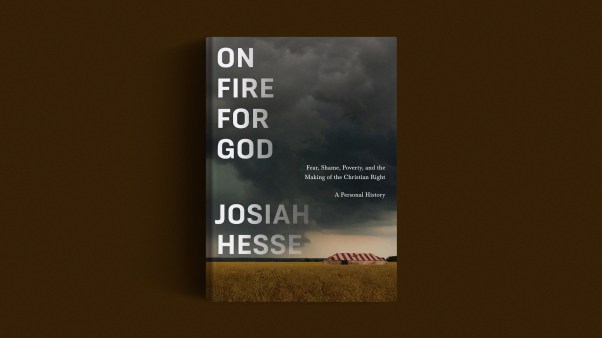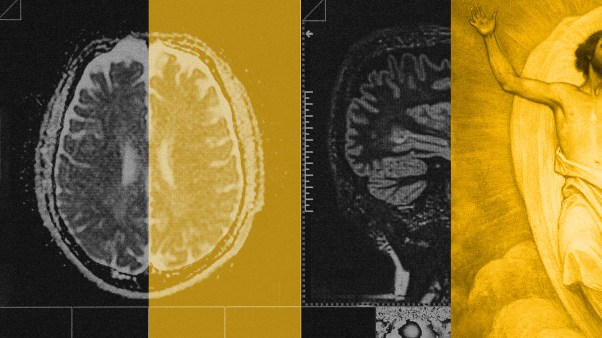In a bookstore near my home, I inquired about the books in the religion section. The clerk, twenty-something with a butterfly tattoo on her arm, explained, “We sell a lot of books on Eastern thought and spirituality, not as many on Western religion.” Then, as if correcting herself, she said, “Not as many on Christianity. I guess that is the only religion based on Western ideals.”
I realized again how we, the church, have painted ourselves into a corner.
In May I toured the MTV studios at Times Square with a group of young pastors. After we bumped into singer Jewel, veejay Jesse, and rockologist Matt Pinfield, some executives shared that in a recent survey of MTV viewers, 99 percent said they believe in God.
Record numbers want to know God, yet Christianity is seen as the religion of the West in a postmodern world that is re-embracing Eastern thought. Yet Christianity is rooted in the East. We worship a savior who spoke an Eastern language, whose birth was signified by a star seen by magi of the East, and whose lineage is a who’s who of the ancient Near East. Yet our faith seems to be inseparably intertwined with Western ideals.
The poisoned Tootsie Pop If you have any doubt that Christianity has swallowed Western thought whole, visit the counseling section of your local Christian bookstore. The assumptions become clear. When times get tough for modern Christians, we look at the Bible through the lenses of Rene Descartes, the father of modern psychology.
As you browse the racks of books, you will find yourself climbing Maslow’s pyramid of self-actualization. Most of us are so accustomed to interpreting Scripture through the lenses of our own needs (as told by Maslow) that we’ve created a Christianity customized to my own priesthood as a believer.
A recent fictional work has captured the spiritual essence of our time. The Celestine Prophecy by James Redfield sold 8.5 million copies, making it the best selling work of fiction in hardcover in modern publishing history. It spent three years on the New York Times bestsellers list.
Redfield’s narrative describes a shift to a spiritual culture. The awakening, he says, “represents the creation of a new, more complete worldview which replaces a 500-year old preoccupation with secular survival and comfort. … The slavish devotion of the modern world to science and reason has (until now) left little room for mystery or true spirituality.”
The New Age movement has met the growing spiritual hunger. This new spirituality does not have real staying power; it falls short. New Age philosophy is heading in the same direction as transcendental meditation and harmonic convergence. It misses the most attractive feature of Eastern philosophy, the value of community.
This neo-mysticism fully embraces the fatal flaw of the Western world: unbridled individualism!
The autonomous individual reigns. He chooses theologies and frameworks that suit his tastes, stirring together an eclectic, personalized spiritual potpourri. It’s Descartes in tie-dye, same stuff in the middle. It should only take a few licks to get to the center of that Tootsie Pop. You will find it laced with the same hedonistic poison that proved fatal to Western modernity.
Bending, but not bowing The Christian community is the hermeneutic and the apologetic of our faith. As we re-enter an Eastern worldview, the Bible calls us out of individualism to be a chosen people, a family that functions together as a body. The church must pray for eyes to see ourselves as the whole body and escape the self-centered, needs-based Christianity that asks questions like “Am I being fed?” or “Are my spiritual needs being met?” Let us ask instead, “Are we loving God and our neighbor?”
God has not called us to a Western worldview or an Eastern worldview, but to one that is Christian. This is intrinsically a missionary worldview.
We must become immersed in the culture without caving in to it. Hans Kung says there are two fatal flaws the church can make: (1) become sectarian by pulling away from the world, and in its isolation lose any effectiveness in changing the world; or (2) fall into syncretism by combining Scripture and the truth of who God is with culture until they are so intertwined that we can no longer tell them apart.
As postmodern missionaries, we must push beyond our logical, Western boundaries into a new place of mystery and wonder.
We walk a fine line. It is our missionary dilemma. We can easily fall off on either side. Instead we must seek to understand the emerging culture and transform it.
Daniel is a perfect picture of how to live immersed in an unbelieving culture and yet stand for truth. Young Daniel was a 4.0 student in the school of Babylon. He was ten times wiser in the subjects of sorcery, astrology, and cultic ritual than the sages who taught him. Daniel even took the Babylonian name Belteshazzar; yet he refused to defile the Most High God by eating unclean food, bowing to idols, or ceasing his times of prayer.
Completely familiar with his culture, Daniel still discerned truth amid pagan teaching. As postmodern missionaries, we must push beyond our logical, Western boundaries into a new place of mystery and wonder. It is our history with its Eastern roots that will carry us there.
One of our greatest obstacles is that the people we refer to as “the lost” may be more spiritual than most of us pastors. It is difficult to teach spiritual disciplines of prayer, study, and meditation to people who are seeking to know God with more clarity and passion than we are.
Christian mystics like Saint John of the Cross and the Desert Fathers can lead us toward a complete faith that encompasses silence and meditation, and puts us on a journey to know and experience God. Truth cannot be limited to propositions. Christ said, “I am the truth.” If the truth of the gospel is to be experienced, the church must embody it. In a postmodern culture, the effort to know Christ must fully engage the head and the heart.
It seems that Redfield and MTV are correct: we are moving toward a more spiritual world, one that faces East. The question is whether Christ or karma will be the focus of our spirituality. I think my sales clerk at the local bookstore is voting for karma. I told her that Christianity is also an Eastern religion. “Hmmm,” she replied. “I dunno, but it’s not gonna be found in the Eastern section of this bookstore.”
Chris Seay is founding pastor of University Baptist Church in Waco, Texas. He is planting a new work, Ecclesia, in Houston.
Copyright © 1999 by the author or Christianity Today/Leadership Journal. Click here for reprint information on Leadership Journal.









